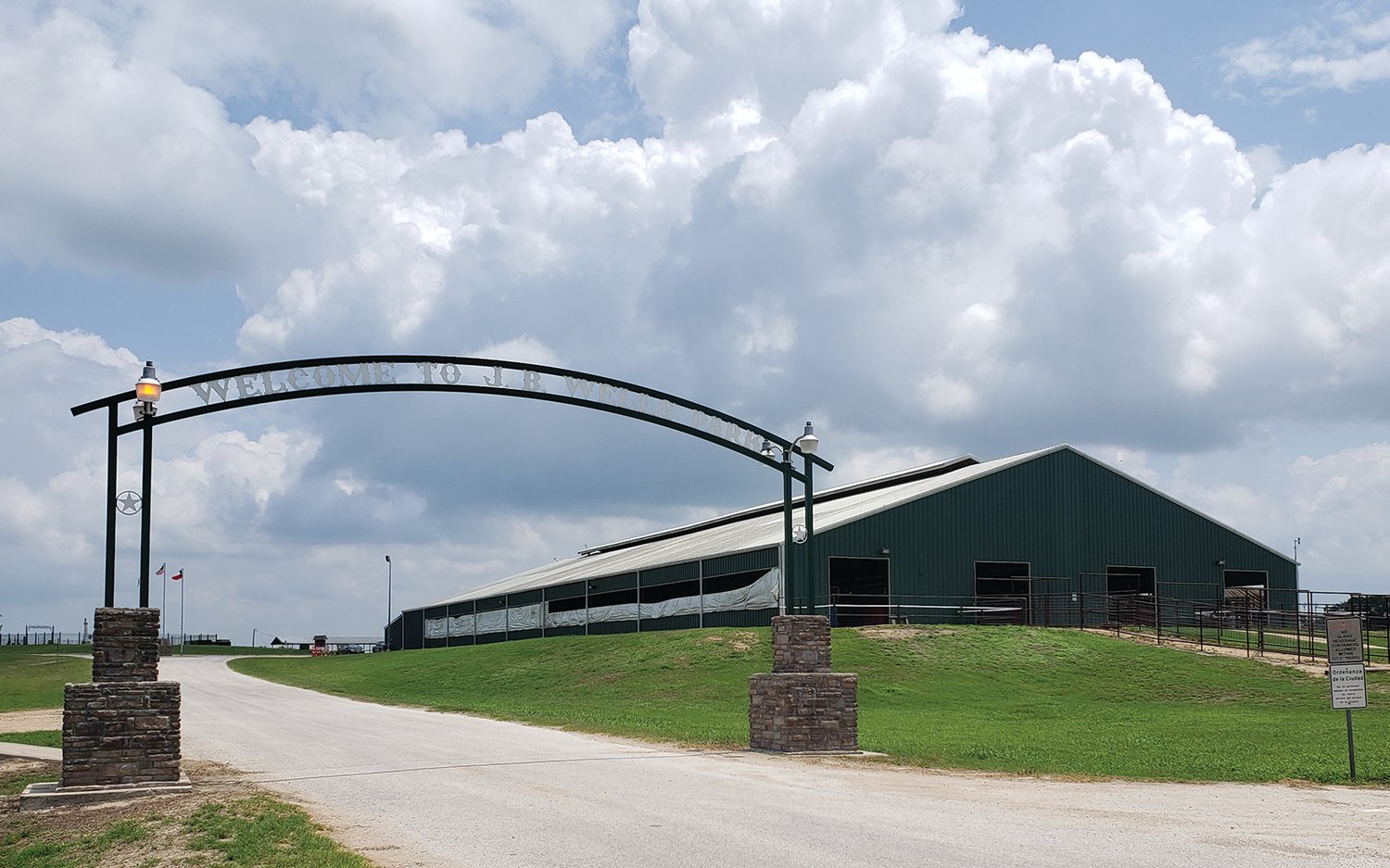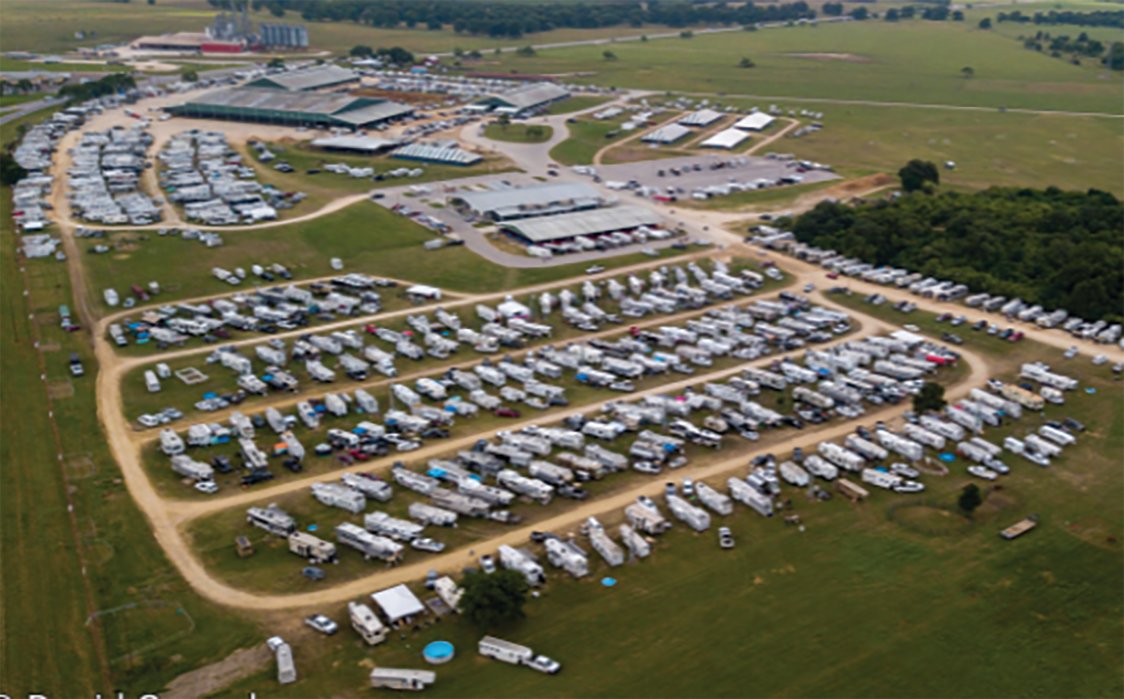GAIN OR DRAIN? Does J.B. Wells Center’s benefit outweigh expenses?
The J.B. Wells Park, Arena and Expo Center has been a center of activity since its opening in 2003, hosting proms and weddings to gun shows COVID-19 vaccination clinics, and rodeos – like the eight-day Texas Junior High State Rodeo Finals running through May 29.
Some in the community see the center as boon to the local economy given the attendees drawn to events at the center; but others look at a deficit in operating revenues and expenses and see a drain on city resources – and taxpayer money.
Gonzales Tourism Director Ashley Simper and former Parks and Recreation Director Anne Dollery say the sales and hotel occupancy tax revenue, as well as traffic to retailers, brought in by the J.B. Wells Park, Arena and Expo are an immeasurable boon to the local economy.
“Immeasurable” might be accurate in more ways than one as there is no formal study tracking Hotel Occupancy Tax (HOT) and sales tax generated for the city from event attendees spending money on hotels, gas, food, shopping and tourism.
Indeed, City of Gonzales Finance Director Laura Zella said the city does not have any data to support the view of Simper and Dollery.
What the city does have is its budget breakdown of expenses and revenues tied to the operation of the center from 2013 to 2020, which The Inquirer received through a records request.
Those numbers show that the complex collected more money than it spent only once: in 2019 when it recorded a surplus of $50,919.68 on $704,898.22 in revenue and $653,978.54 in expenditures.
Over the eight-year span, based on the city’s budget accounting, the complex has lost more than $1.2 million on revenues of $4,601,025.97 versus $5,820,549.15 in expenses.
The center’s finances from its opening in 2003 to 2012 aren’t available.
City Secretary Kristina Vega said the park’s budget was combined with that of the Parks and Recreation Department and essentially inseparable for those years.
More Than The Budget
Dollery, who continues to work for the city on a contract basis, said she wouldn’t know where to start when trying to calculate the economic impact of J.B. Wells throughout the year. With multiple events drawing different crowds every weekend throughout the year, it’s unclear how much traffic J.B. Wells drives through the local economy.
“There's no telling, because I'll tell you, that arena's booked up every single weekend,” Dollery said. “If that arena ever goes away, the town will dry up. The main tourism is the arena. I mean, there's no way to figure that (economic impact) out.”
“You would have to do a major economic study on it, and I don't even know how they'd do it. But you have something there every weekend. You're bringing people into town every single weekend, different people. It’s not the same event. I wouldn't even know how to answer that.”
Dollery said the events spill out into the community through hotels, restaurants, gasoline purchases, store sales, and local lodgings.
The arena collects rental fees for each day an event is held, with the first day of a weekend or holiday event being $600, and additional days $550. Weekday rates Monday through Friday are $375. For rodeo events, stalls are available for rental at $20 a day. Other sources of revenue include the sale of wood shavings, concessions, souvenirs and RV site rental.
Gate fees collected for events are not part of the arena’s revenue, and are kept by the hosting organizationg, Dollery said.
One slice of data from 2018 does show that the economic impact of the Texas Junior High Rodeo and Texas Youth Rodeo generated more than $578,000 for the city.
This is the only formal record of economic impact to the city from J.B. Wells currently in existence, according to Simper.
Simper said additional traffic to the city’s retail and lodging sector makes the park an asset to local revenue streams. The Inquirer requested data to support this from Simper, but did not have a reply as of publication time.
Helped During COVID-19
During coronavirus, the arena provided a venue for outdoor events which allowed limited traffic and revenue-generating events to take place, Simper said.
“During the height of the pandemic, when executive orders had travel restricted, many business operations greatly decreased and revenue-generating events banned, the importance of these facilities — and the arena in particular — were spotlighted,” Simper said. “Since equestrian events were able to continue in Texas much sooner than other ‘normal’ business operations, the events, though modified, held at the arena helped to sustain the tourism industry in Gonzales to a large degree by continuing to generate HOT and sales tax revenue during a pandemic. This not only supported tourism, but Gonzales as a whole.”
Expenditures and Revenues
The center is part of the Parks and Recreation Department, but under a separate budget. Each fiscal year runs from Oct. 1 to Sept. 31, and the budget is balanced with the General Fund, according to Zella.
This happened in the seven of eight years between 2013 and 2020 that the center spent more than it generated.
There are five funds in the city budget: J.B. Wells, the General Fund, Capital Projects, Debt Service, and Special Revenue.
The largest sources of revenue for the city, according to Comprehensive Annual Financial Reports, are sales and property tax.
The largest expenditures incurred by the park year-over-year are staff salary and contractor or operator services.
Dollery said that this is because J.B. Wells is expensive to operate, as it takes a lot of labor to keep the place running.
“It's very labor intensive, and I'll tell you why,” Dollery said. “Because you’re cleaning stalls, non-stop, because they leave on Sunday. You’re cleaning stalls and you have to have staff out there with the people. And then on Monday, you're cleaning up to get ready for your next event.”
The Big Picture
It is clear what the park costs the city, between the expense of maintaining the facility and continued litigation, which the Inquirer has reported previously. The total of J.B. Wells Park expenditures, from 2013 on, combined with legal expenses to the city, is $6,173,584, according to documents obtained by the Inquirer through Public Information Act requests. But the actual figure of money brought into the city by the park on an annual basis is unclear.
The park does have a Certificate of Obligation, but Zella said that is paid separately through a 50-50 agreement between the Gonzales Economic Development Corporation and Hotel Occupancy Taxes. Any legal fees for J.B. Wells litigation, which is its own separate budget item, are not paid out of the J.B. Wells fund, but the General Fund.
Comments










